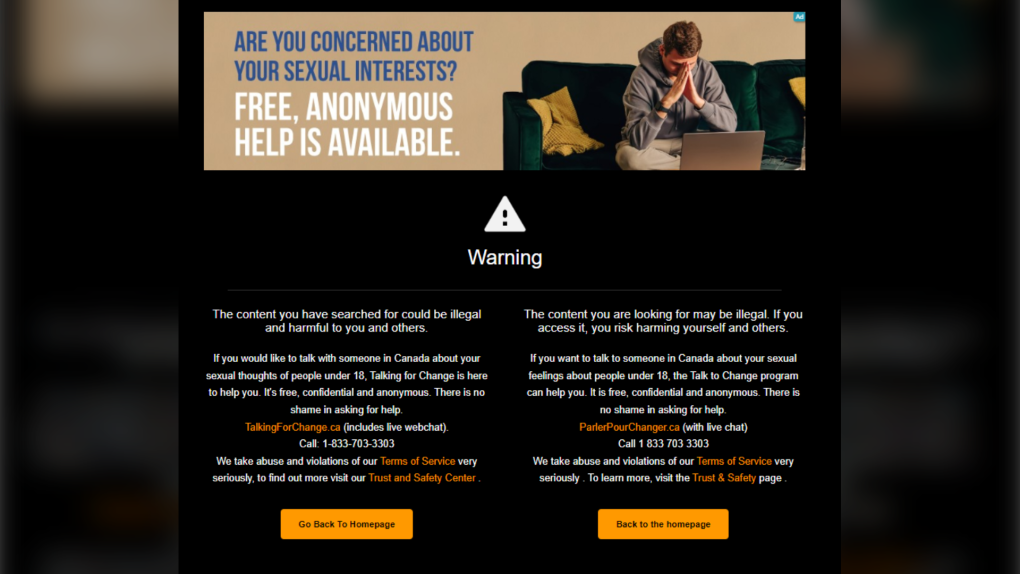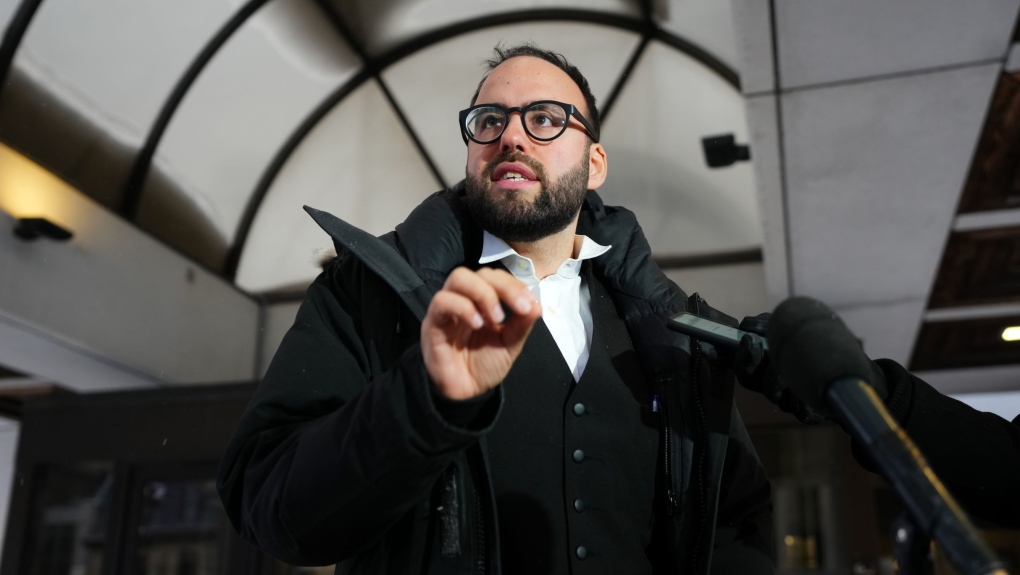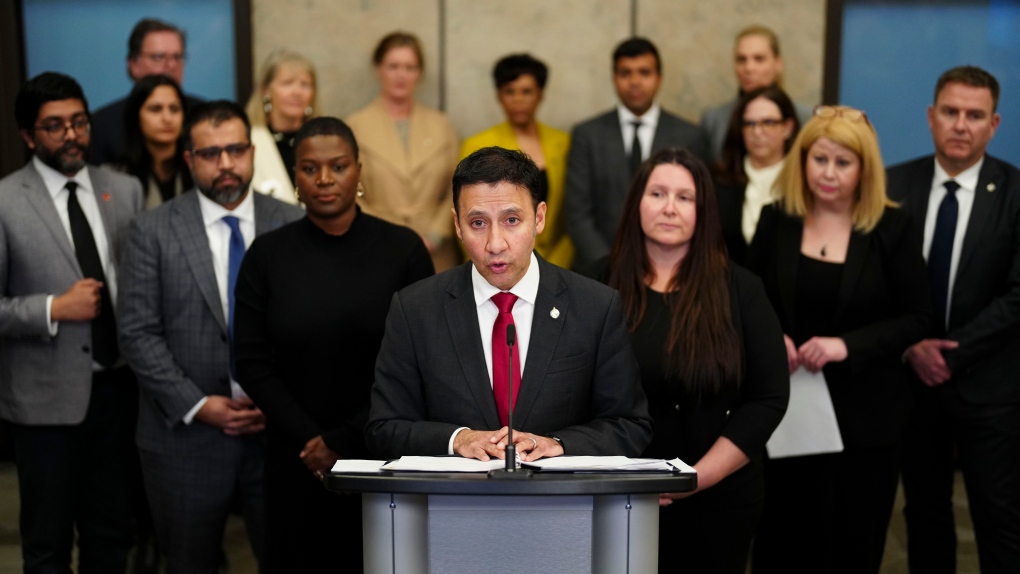Pornhub owner touts new policies to prevent illegal videos on its site

Nearly one year after taking over the world's largest pornography website, Pornhub's parent company, Aylo, says it "regrets" having hosted illegal content in the past but said changes have been made to prevent it from happening again.
Aylo admitted on Dec. 21, 2023, that it profited from videos of sex trafficking.
It avoided a criminal conviction by entering into a deferred prosecution agreement with the U.S. Attorney's Office for the Eastern District of New York.
The Montreal-founded company had to pay the U.S. government $1.8 million as part of the deal.
"Notwithstanding that we've entered into a deferred prosecution agreement, we obviously regret the fact that criminals misused our platform, that although they showed us consent forms, as we later learned, those consents were obtained by fraud or coercion, we regret hosting that content and we are doing what it takes to make that right," said Solomon Friedman, vice-president of compliance at Ethical Capital Partners (ECP), the Ottawa-based private equity firm that owns Aylo.
Friedman, who is also a criminal defence lawyer, said that the deal with U.S. prosecutors happened because they acknowledged "Aylo’s commitment to remediating and improving its compliance program and internal controls."
Some of those controls were demonstrated during a virtual information session for the media this week at the company's Montreal headquarters. Friedman and other officials explained how the company is turning the page on its checkered history as it marks the one-year anniversary since ECP bought Aylo, formerly known as MindGeek.
Changes to the Pornhub website include verification of new video uploads.
The latest update to the site was on Jan. 23, 2024, now requiring content creators to provide consent and identification paperwork to the site's moderators for each individual who appears in a pornographic video before it's uploaded, which was not done previously.
"If we cannot verify the identity of those appearing in the content, the content simply doesn't go live to the public," Friedman explained, adding that even for videos in which people's faces are not visible, moderators still have to verify their identities.
The measure is meant to prevent non-consensual and child sexual abuse material (CSAM) from being posted on Pornhub.
Another tool, introduced in 2021, refers users who search for terms related to CSAM to seek resources for their urges to watch illegal underage content.
 A screenshot of deterrence messaging on Pornhub. (Source: Aylo)
A screenshot of deterrence messaging on Pornhub. (Source: Aylo)
Company's moderator numbers not disclosed
The company has touted its desire to be more "open" and "transparent" than before.
Still, it hasn't been entirely forthcoming with details on its moderation teams, who must review the massive catalogue of videos it hosts.
The company had 6.83 million video uploads in 2019 on Porhub, its flagship site. The company also runs several other tube sites, such as YouPorn, RedTube, and xTube.
 Defence lawyers Solomon Friedman speaks to reporters outside the Ottawa Court in Ottawa on Thursday, Feb. 23, 2023. THE CANADIAN PRESS/Sean Kilpatrick
Defence lawyers Solomon Friedman speaks to reporters outside the Ottawa Court in Ottawa on Thursday, Feb. 23, 2023. THE CANADIAN PRESS/Sean Kilpatrick
Friedman would only say that the company has more than 1,400 employees in Canada and that "20 per cent of Aylo's workforce works on trust and safety full-time," though not all of them work as moderators.
"We have sufficient moderators that [ensure] every uploader is verified, every piece of content is moderated. If we have fewer, it takes longer, if we have more, it goes faster," he said, "but no content goes live unless it is moderated."
When asked by CTV News, Aylo did not provide the number of moderators it currently employs.
Website moderation has been at the heart of the controversies surrounding Pornhub in recent years, including as recently as last month when the federal privacy commissioner released a report on Aylo.
The report found the company violated federal privacy laws by allowing intimate images to be shared without direct knowledge or consent.
Commissioner Philippe Dufresne's report stemmed from a complaint from a woman who claimed her ex-boyfriend uploaded sexually explicit videos of her to Aylo's sites without her permission, which led to "severe" impacts on the victim, "including social stigmatization, psychological damage, financial loss, and even attempted suicide," according to the investigation.
Dufresne made several recommendations, including that Aylo obtain "meaningful and valid consent" from every individual who appears in the site's content.
Friedman told reporters that "by now, we are of the view that we are in substantial compliance with the regulations as well as with the recommendations of the Privacy Commissioner."
Aylo calls Canadian senator's porn bill 'absurd'
In recent months, Aylo has said it would consider blocking Canadians access to Porhub should a proposed Senate bill become law.
Bill S-210, an Act to restrict young persons’ online access to sexually explicit material, passed in the Senate last April and was referred to the House of Commons Standing Committee on Public Safety and National Security in December.
It would require Canadians to verify their age to access a porn site.
The proposed verification method in the bill, as currently drafted, has raised some concerns among privacy experts.
The bill mentions creating a digital ID system or services that can estimate an individual's age based on a visual scan of their face — proposals that Aylo opposes.
"Having people required to provide their ID to thousands, if not thousands, tens of thousands or millions of adult sites in order to access content is absurd," Friedman said. "The prospects of identity theft and fraud and civil mistrust on the part of the users is just massive. And we will not collect the personal identifying information of our users. So when it comes to S-210, you know, we hope that the government gets it right."
Michael Geist, a University of Ottawa law professor and the Canada Research Chair in internet and e-commerce law, has called it "the most dangerous Canadian internet bill you've never heard of."
 Arif Virani, Minister of Justice, and Attorney General of Canada, speaks during a press conference on Parliament Hill in Ottawa regarding the new online harms bill on Monday, Feb. 26, 2024.THE CANADIAN PRESS/Sean Kilpatrick
Arif Virani, Minister of Justice, and Attorney General of Canada, speaks during a press conference on Parliament Hill in Ottawa regarding the new online harms bill on Monday, Feb. 26, 2024.THE CANADIAN PRESS/Sean Kilpatrick
Aylo prefers device age verification, for example, on operating systems for smartphones and computers, "that can prevent minors’ accounts from accessing adult content without risking the disclosure of sensitive user data."
Most Liberal MPs oppose the Senate bill because their party has been working on its own Online Harms bill, introduced last month.
"We're of the view that good regulation is important in this sector, that there are really good first steps in that legislation," Friedman said of the federal bill, noting that "we already comply with every single measure in that piece of legislation."
Aylo said it supports the federal government's bill, and it looks forward to testifying before Parliament to provide its input.
CTVNews.ca Top Stories

More than 115 cases of eye damage reported in Ontario after solar eclipse
More than 115 people who viewed the solar eclipse in Ontario earlier this month experienced eye damage after the event, according to eye doctors in the province.
Toxic testing standoff: Family leaves house over air quality
A Sherwood Park family says their new house is uninhabitable. The McNaughton's say they were forced to leave the house after living there for only a week because contaminants inside made it difficult to breathe.
Decoy bear used to catch man who illegally killed a grizzly, B.C. conservation officers say
A man has been handed a lengthy hunting ban and fined thousands of dollars for illegally killing a grizzly bear, B.C. conservation officers say.
B.C. seeks ban on public drug use, dialing back decriminalization
The B.C. NDP has asked the federal government to recriminalize public drug use, marking a major shift in the province's approach to addressing the deadly overdose crisis.
OPP responds to apparent video of officer supporting anti-Trudeau government protestors
The Ontario Provincial Police (OPP) says it's investigating an interaction between a uniformed officer and anti-Trudeau government protestors after a video circulated on social media.
An emergency slide falls off a Delta Air Lines plane, forcing pilots to return to JFK in New York
An emergency slide fell off a Delta Air Lines jetliner shortly after takeoff Friday from New York, and pilots who felt a vibration in the plane circled back to land safely at JFK Airport.
Sophie Gregoire Trudeau on navigating post-political life, co-parenting and freedom
Sophie Gregoire Trudeau says there is 'still so much love' between her and Prime Minister Justin Trudeau, as they navigate their post-separation relationship co-parenting their three children.
Last letters of pioneering climber who died on Everest reveal dark side of mountaineering
George Mallory is renowned for being one of the first British mountaineers to attempt to scale the dizzying heights of Mount Everest during the 1920s. Nearly a century later, newly digitized letters shed light on Mallory’s hopes and fears about ascending Everest.
Loud boom in Hamilton caused by propane tank, police say
A loud explosion was heard across Hamilton on Friday after a propane tank was accidentally destroyed and detonated at a local scrap metal yard, police say.































